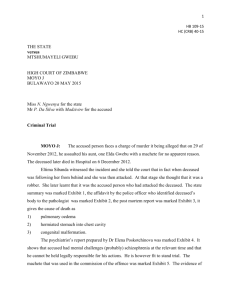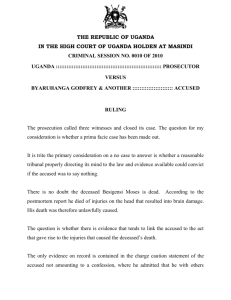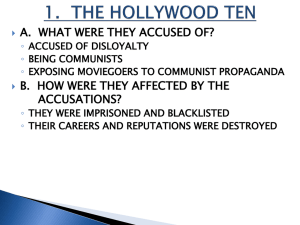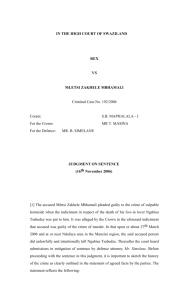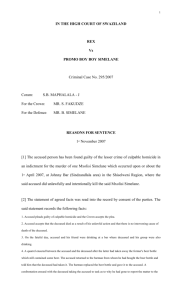SZHC_105_2006_1
advertisement
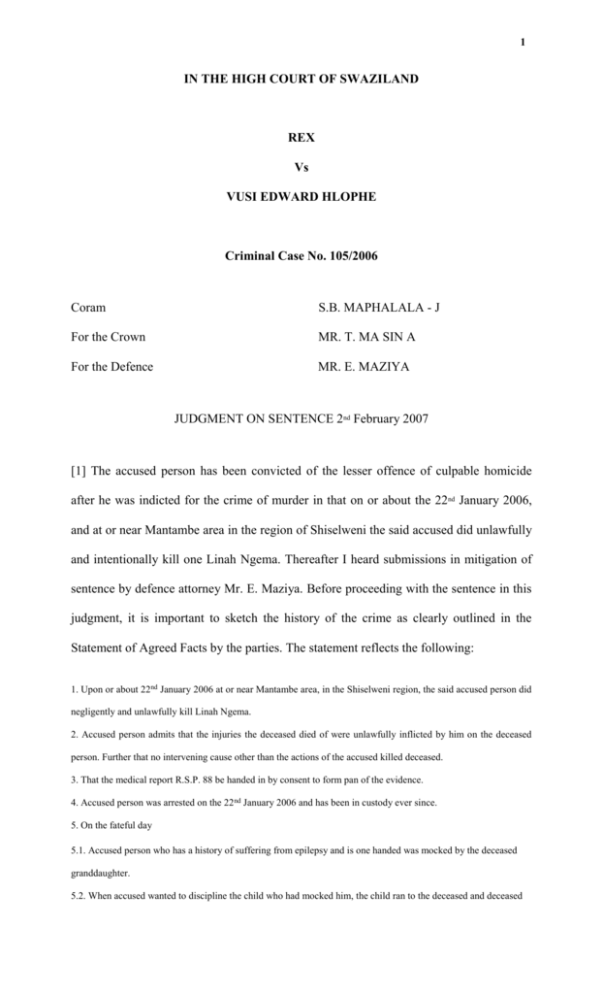
1 IN THE HIGH COURT OF SWAZILAND REX Vs VUSI EDWARD HLOPHE Criminal Case No. 105/2006 Coram S.B. MAPHALALA - J For the Crown MR. T. MA SIN A For the Defence MR. E. MAZIYA JUDGMENT ON SENTENCE 2nd February 2007 [1] The accused person has been convicted of the lesser offence of culpable homicide after he was indicted for the crime of murder in that on or about the 22nd January 2006, and at or near Mantambe area in the region of Shiselweni the said accused did unlawfully and intentionally kill one Linah Ngema. Thereafter I heard submissions in mitigation of sentence by defence attorney Mr. E. Maziya. Before proceeding with the sentence in this judgment, it is important to sketch the history of the crime as clearly outlined in the Statement of Agreed Facts by the parties. The statement reflects the following: 1. Upon or about 22nd January 2006 at or near Mantambe area, in the Shiselweni region, the said accused person did negligently and unlawfully kill Linah Ngema. 2. Accused person admits that the injuries the deceased died of were unlawfully inflicted by him on the deceased person. Further that no intervening cause other than the actions of the accused killed deceased. 3. That the medical report R.S.P. 88 be handed in by consent to form pan of the evidence. 4. Accused person was arrested on the 22nd January 2006 and has been in custody ever since. 5. On the fateful day 5.1. Accused person who has a history of suffering from epilepsy and is one handed was mocked by the deceased granddaughter. 5.2. When accused wanted to discipline the child who had mocked him, the child ran to the deceased and deceased 2 was bias protected her. 5.3. Accused person then picked up a stone with the intention of chastising the child threw the stone towards the direction of the child, unfortunately the stone missed the child and struck the deceased fatally. 6. The accused person remorsefully tenders a plea of guilty to the crime of culpable homicide which plea the Crown accepts. [2] In mitigation of sentence it was contended for the accused that the court ought to consider that he is a first offender and that he is disabled in his left arm. The court was further told that the accused is 33 years old and suffers from epileptic fits. [3] Presently, the court is concerned with the question of what sentence to impose in the circumstances. The general principles in this regard are trite and were forcefully enunciated in the "triad ofZinn 's case" (S vs Zinn 1969 (2) S.A. 537 (AD) at 540 G) where the court laid down the following criterion: "What has to be considered is the triad consisting of the crime, the offender and interest of society". Furthermore the Appellant Division in the case of R vs Swanepoel 1945 AD 444 at 454 summed up the position as follows: "The ends of punishment are four in number, and in respect of the purposes to be served by it, punishment may be distinguished as 1. deterrent, 2. preventive, 3. reformative, 4. retributive of these aspects the first is the essential and all important one, the others being merely accessory". The triad was also expanded upon in the case of S vs Qamata and another 1997 (1) S.A. 479 where Jones J refined it as follows: "It is now necessary for me to pass sentence. It is proper to bear in mind the chief objectives of criminal punishment namely, retribution, the prevention of crime, the deterrence of criminals, and the reformation of offender. It is also necessary to impose a sentence, which has a dispassionate regard for the nature of the offence, the interests of the offender, and the interests of the society. In weighing these considerations should bear in mind the need: a) to show an understanding of and compassion for the weaknesses of human beings and the reasons why they commit serious crimes, by avoiding an overly harsh sentence; b) to demonstrate the outrage of society at the commission of serious crimes by imposing an appropriate and If necessary, a severe sentence; and c) to pass a sentence, which is balanced, sensible, and motivated by sound reasons and which therefore meet with the approval of the majority of law-abiding citizens. If I do not. the administration of justice will not enjoy the confidence and 3 respect of society. [4] These are the legal authorities and facts in this matter. I have considered from the facts that the accused had intended to hit the child but he mistakenly hit the grandmother who subsequently died. Clearly the accused did not intend to kill the deceased. The accused has been in custody for over a year and I think that is punishment in itself. [5] In the result, the accused is sentenced to 5 years imprisonment, the whole sentence is suspended for a period of 3 years on condition the accused is not convicted of an offence in which violence is an element committed during the period of suspension. S.B. MAPHALALA JUDGE




